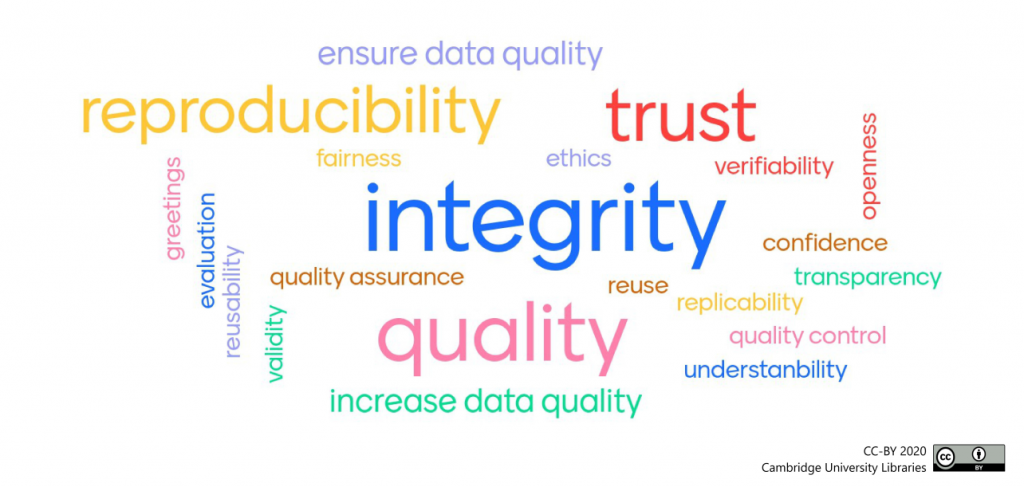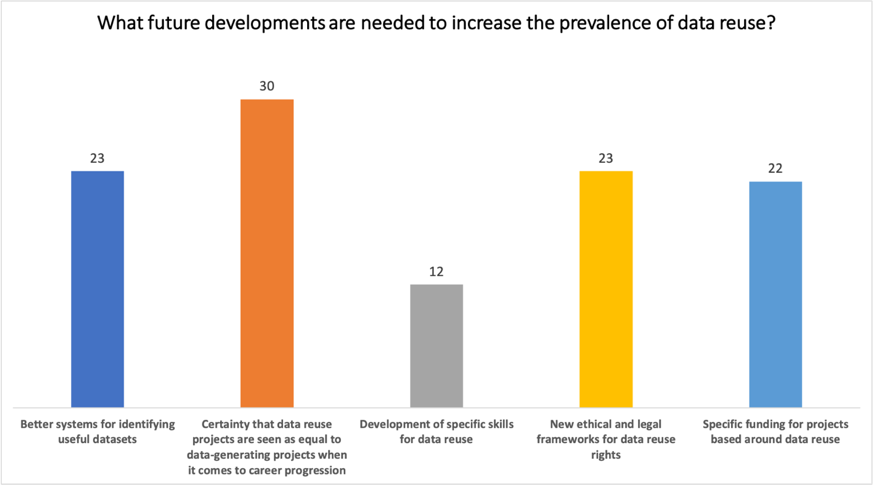Cambridge Data Week 2020 was an event run by the Office of Scholarly Communication at Cambridge University Libraries from 23–27 November 2020. In a series of talks, panel discussions and interactive Q&A sessions, researchers, funders, publishers and other stakeholders explored and debated different approaches to research data management. This blog is part of a series summarising each event:
The rest of the blogs comprising this series are as follows:
Cambridge Data Week day 1 blog
Cambridge Data Week day 2 blog
Cambridge Data Week day 4 blog
Cambridge Data Week day 5 blog
Introduction
The third day of Cambridge Data Week consisted of a panel discussion about the relationship between reproducibility and Research Data Management (RDM), looking for ways to advocate effectively to reach positive outcomes in both areas. Alexia Cardona (University of Cambridge), Lennart Stoy (European University Association), Florian Markowetz (University of Cambridge & UK Reproducibility Network), and René Schneider (Geneva School of Business Administration) offered their perspectives on whether RDM really is just a ‘footnote’ to the more popular concept of reproducibility.
The speakers agreed that we are still in need of cultural change towards better data management and reproducibility. The word ‘reproducibility’ is more likely to excite researchers and it is important to craft messages that work for each group, hence the emphasis on this term. In contrast to the Cambridge Data Week event on data peer review, the discussion here focused on engaging senior researchers, from PIs to Heads of Institutions, motivating them to be not just good data managers, but great data leaders.
Among the key elements needed to drive best practice in this area, two stood out. The first is communities. Whether these are reproducibility circles of peers, or networks like the Cambridge Data Champions, communities are key to creating and implementing guidelines for data management. The second element is a solid technological infrastructure. For instance, block chains could be used to enable reproducibility in citations in the humanities, or Persistent Identifiers, used at a very granular level, could lead to better data reuse.
Recording , transcript and presentations
The video recording of the webinar can be found below and the recording, transcript and presentations are present in Apollo, the University of Cambridge repository.
Bonus material
There were a few questions we did not have time to address during the live session, so we put them to the speakers afterwards. Here are their answers:
What are good practices regarding data deletion?
Florian Markowetz It very much depends on what kind of data you have, it’s hard to give general directions. However, drives and other hardware are becoming cheaper and cheaper, so I would say ‘save everything’.
René Schneider I would agree. I have spoken to researchers who keep all their data, because it would create too much work to sort what to keep and what to delete.
Alexia Cardona We tend to talk more about data archiving than data deletion. I often hear about data deletion where it has created problems, for example an account has been deleted in bulk when a researcher left an institution, so unpublished data and scripts are lost due to lack of communication. There are also cases on the internet of PhD students losing all their thesis when the laptop crashed, so this issue goes hand in hand with data storage and backup. Let’s focus on good practices and archiving of data, deletion is the very last thing to worry about.
Lennart Stoy It’s worth mentioning that there is often a compulsory period that data should be kept for, perhaps 3 years or 5 years according to funders mandates, so data should be stored for some time. I suppose the expense could become an issue in the coming years, some Universities are already concerned about the cost of having to buy large amounts of cloud storage space. There are also discussions in the Open Science Could teams about what to preserve in the long term. We want to make sure we preserve the higher value datasets, but of course it’s hard to define which ones those are.
Couldn’t scholarly communities of practice or learned societies create guidelines for reproducibility and good data management?
Lennart Stoy Absolutely, they must be involved as they are the ones with the specific knowledge. This is the idea behind Research Data Alliance (RDA) and the National Research Data Infrastructure (NFDI) in Germany. In those cases, you have to prove a link to the community in that field to establish a consortium. It is great when communities structure their areas of infrastructure from the bottom up.
What roles could Early Career Researchers (ECRs) have? Could they act as code-checkers to assist reproducibility, or are we asking too much of them given their busy schedules? Would they receive credit for this?
Florian Markowetz Senior academics have no excuses for not getting more involved in this once they have stable positions. It’s easy for people in my position to point to students, or to funders, saying they are not doing enough, but we should not be pointing away from ourselves, we should do the work. It could be coupled to pay rises: if you hold any role above grade 12 it’s your job now to sort this all out.
René Schneider I have been thinking about the role of data custodians or similar. If we ask researchers to spend a lot of time just checking data, like ‘warehouse workers’, we could be undervaluing their role. I don’t think it’s necessarily the researchers who should do the work, especially not ECRs, there should be other roles dedicated to this.
Alexia Cardona I second that, researchers are supposed to focus on the research, not necessarily the data checking and curation. But the unfortunate truth is that with short contracts and lack of resources the work is left to them. Another problem is the lack of rewards. For instance in my area, training, there’s no reward for people who take the time to make their training FAIR. We should embrace more openness and fairness, including rewarding those who do the work.
Lennart Stoy This is something we’ve been working on but it’s a challenging system to change because there are so many elements to disentangle. It relates to intense competition for jobs, the culture in different disciplines, and the pressure to publish in certain journals. Some Universities are very serious about implementing DORA and I hope that in a few years these will be able to show high levels of satisfaction among PhD students and ECRs. A lot depends on the leadership at the institutional level to initiate change, for instance the rector at Ghent University in Belgium has been driving DORA-inspired reward mechanisms and the Netherlands is also moving ahead and moving away from journal-based factors. The University of Bath is an example in the UK that I’ve heard mentioned a lot. We’re following progress in all these examples and will write up DORA good practice case studies to inspire other organisations. But it is a hard problem, ECRs have a lot on the line, it’s important not to jeopardise their careers.
Conclusion
This compelling discussion left us feeling that it does not matter too much which words we emphasise: reproducibility, data management, data leadership, or something else entirely. What matters is that we spark interest and commitment in the right groups of researchers to drive progress. Creating a culture where great research practices are routine will take effective advocacy, but also rewards that align with our aims and the right technical infrastructure to underpin them.
Resources
UK data service is a data repository funded by the Economic and Social Research Council (ESRC), which also provides extensive resources on data practices.
The journal PLOS Computational Biology introduced a pilot in 2019 where all papers are checked for the reproducibility of models.
Is there a reproducibility crisis? Baker’s 2016 paper in Nature reporting the results of a survey that exposed the extent of the reproducibility crisis.
San Francisco Declaration on Research Assessment (DORA), a set of recommendations for institutions, funders, publishers, metrics companies and researchers, aiming for a fairer and more varied system of research quality assessment.
Published on 25 January 2021
Written by Beatrice Gini


